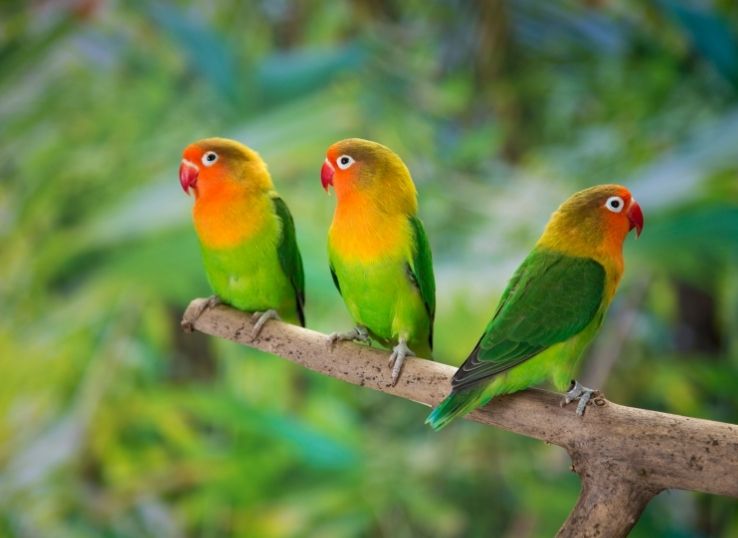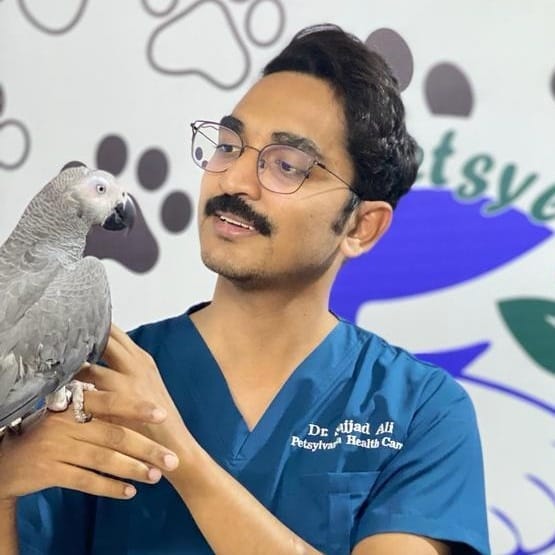Why are Lovebirds Called Lovebirds (5 Reasons Why?)
Last Updated on January 12, 2024 by Ali Shahid

There is no surprise that lovebirds are among the most popular pets among parrot owners who are familiar with them. Their attractive appearance and superior intelligence make them a favorite parrot species in Africa. However, there is a general question: why are lovebirds called lovebirds?
Lovebirds are called lovebirds because they strongly bond with one mate for their whole life, showing a lot of care and affection, much like how people show love. The name “lovebirds” comes from the Greek words “agape,” meaning love, and “ornis,” meaning bird. So, “Agapornis,” their genus name, literally means “birds that love each other.” These birds like being social and don’t enjoy being alone. If one bird from a pair passes away, the other can feel very sad and might even die from this sadness. They have special ways to talk to their mate and babies, creating their own language.
However, they can be quite protective of their territory and might act tough, even with other lovebirds. But, during mating times, they can also get a bit aggressive or moody. When kept as pets, they’re usually paired up for company. However, if alone, they can form a bond with their human caregivers. To keep them happy, it’s essential to give them a big space and lots of things to keep their minds busy.
How Did Lovebirds Get Their Name?
It was because of their innate tendency to form close bonds with one another that they were given the name lovebirds. In particular, a pair of lovebirds. In humans, as well, the term ‘lovebirds’ makes sense. When couples spend a lot of time together, the saying appears now and then.
Unlike most birds living in groups or colonies, lovebirds actively search for partners of opposing sexes to mate, live with, and care for. There’s no doubt that they care. A couple typically mates for life and exhibits a range of affectionate behaviors with each other.
Their behavior includes preening each other’s feathers, huddling together, and sitting on perches together. Lovebirds naturally express affection with their movements.
Are lovebirds actually in love?
Yes, a pair of lovebirds are in love. They are renowned for forming strong and enduring pair bonds, with several species known to remain together for a lifetime. The name “lovebirds” aptly mirrors their behavior. These avian companions not only mate for life but also spend significant time in close proximity to their mate.
When separated, they may experience longing and even display behavior reminiscent of human depression. Upon reuniting, they engage in the touching act of feeding each other, reaffirming their deep bond. It’s worth noting that the expression of love and companionship in lovebirds can vary depending on the specific species.
5 Reasons Why Lovebirds Are Called Lovebirds
The Evolutionary Significance of Monogamy in Voles and Lovebirds
It’s commonly understood that mating primarily serves as a means to pass on genetic material. However, in certain species like voles, the practice of monogamy offers evolutionary advantages. Valentine’s Day symbolizes the intricate sentiments displayed predominantly by lovebirds, earning them the endearing moniker ‘lovebirds’. Among avian enthusiasts and pet owners, the distinct plum parrot stands as a cherished favorite.
The Lifelong Commitment of Monogamous Lovebirds
Monogamous lovebirds typically reach sexual maturity around ten months into adulthood. The mating rituals commence during courtship and persist for an impressive span of about 15 years. The cohesive social behaviors observed within bird flocks owe much of their stability to the principle of monogamy. Interestingly, birds experiencing separation or loss of their mate often exhibit behaviors reminiscent of depression, mirroring their wild counterparts.
The Emotional Resilience and Affectionate Rituals of Lovebirds
When a lovebird’s partner passes away, the remaining bird frequently endures a prolonged period of sorrow. To reaffirm their bond after extended separation or stress, breeding pairs engage in a heartwarming ritual of feeding each other. This act, reminiscent of human affection, contributes to their fitting designation as ‘lovebirds’.
The Social Needs of Lovebirds
Contrary to popular misconceptions, lovebirds don’t inherently require constant companionship to avoid depression. However, for optimal health and happiness, bird owners should allocate ample time for play and social interaction. Once acclimated, lovebirds perceive their human caregivers as companions; neglecting them may induce feelings of loneliness and stress, further cementing their apt title of ‘lovebirds’.
The Unique Communication and Territorial Traits of Lovebirds
Owing to their profound bond, lovebirds have cultivated a distinct language passed down through generations. While they exhibit tolerance towards others, they remain somewhat territorial. In instances of intrusion into their habitat, lovebirds react swiftly and assertively, underscoring their protective nature.
How do Lovebirds Show Effection to Each Other?
Mutual Preening
Lovebirds share a unique bond expressed through mutual preening. This act, where they delicately groom each other’s feathers, goes beyond mere maintenance. It symbolizes a deep intimacy and affection, reflecting the depth of their relationship.
Vocal Expressions
Through chirping, singing, and various vocalizations, lovebirds articulate feelings of happiness, contentment, and a yearning for attention. These sounds serve as audible tokens of their loving relationship, reinforcing their affectionate connection.
Feeding Rituals
An endearing act among lovebirds is the exchange of food, often termed regurgitation. This behavior isn’t just about sustenance; it’s a symbol of trust and partnership. Such gestures become especially pronounced after periods of separation or when facing challenges, reaffirming their bond.
Cuddling and Togetherness
It’s common to observe lovebirds nestled close, often engaged in cuddling. This physical closeness isn’t just about warmth; it’s a tangible display of their affectionate bond and the comfort they derive from each other’s presence.
Playful Interactions
Lovebirds, in their playful demeanor, often indulge in activities together. Whether it’s playful interactions or shared moments with toys, these activities underscore their bond, highlighting shared joy and mutual happiness.
Contact Calls
When distance separates them, lovebirds rely on contact calls. These unique vocalizations serve as a means to stay connected, ensuring they remain in sync and find each other effortlessly when apart.
Nesting Together
During breeding periods, lovebirds exhibit remarkable teamwork. They collaboratively build nests and prepare for egg-laying, showcasing their commitment and mutual cooperation, further solidifying their relationship.
Interpreting Body Language
Deciphering a lovebird’s body language provides insights into their emotions. A relaxed stance, with an upright head and body, often indicates feelings of happiness and contentment, particularly when directed towards their mate.

